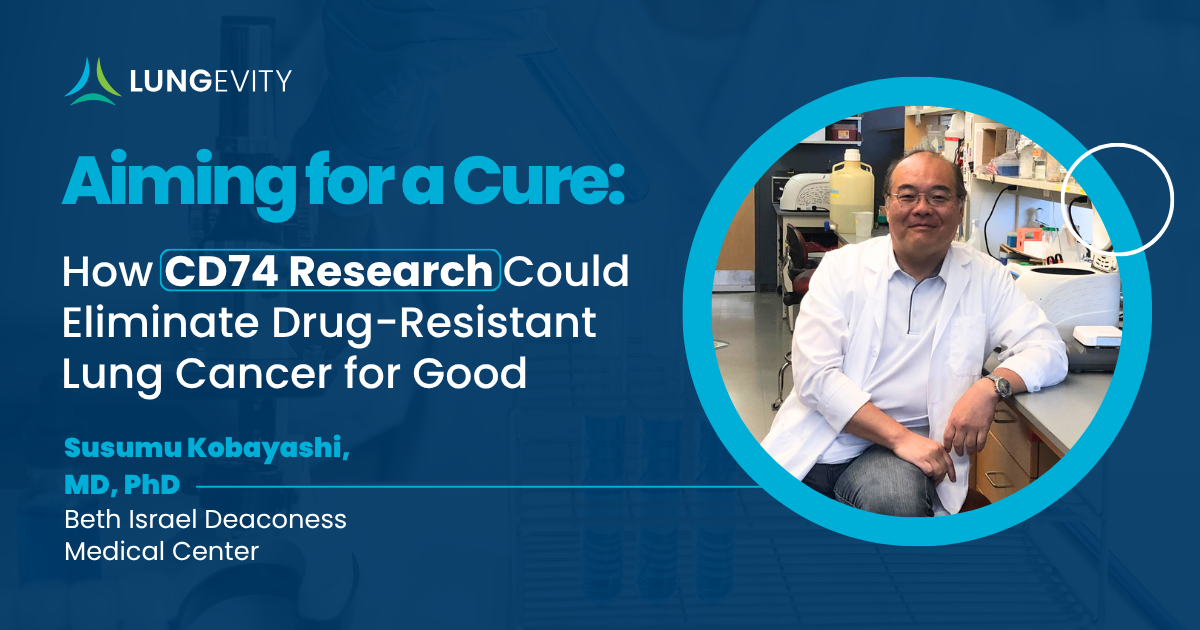Lung cancer remains the leading cause of cancer death worldwide. Over the past two decades, the development of targeted therapies, particularly tyrosine kinase inhibitors (TKIs), has brought real hope to people with EGFR-positive lung cancer—a lung cancer subtype driven by specific mutations in the EGFR gene. These drugs can shrink tumors dramatically, sometimes so much that they seem to disappear on scans. But beneath these promising results lies a stubborn problem: a small number of cancer cells survive. These cells are known as drug-tolerant persister cells (DTPCs). Over time, these DTPCs can grow back, leading to cancer recurrence.
Finding ways to eliminate DTPCs has become one of the most urgent challenges in lung cancer research. And now, with support from an EGFR Resisters/LUNGevity Research Award, Susumu Kobayashi, MD, PhD, a world-renown physician-scientist at Beth Israel Deaconess Medical Center, and his team are pursuing a bold new approach: targeting a novel protein called CD74 that may hold the key to overcoming drug resistance.
The Promise and the Challenge of TKIs
Since the first generation of TKIs were introduced in the early 2000s, the treatment of EGFR-positive non-small cell lung cancer (NSCLC) has transformed. Patients often experience relief from symptoms, longer survival, and improved quality of life. Each new generation of TKIs (first, second, third, and now fourth generation) has aimed to outsmart the drug resistance mechanisms that tumors develop.
Dr. Kobayashi has been studying this resistance since the beginning. He pioneered our understanding of drug resistance to gefitinib with a seminal study in the New England Journal of Medicine in 2005.
But as he explains, “None of these TKIs have led to a cure. There is a dramatic initial benefit, but tiny populations of persister cells remain. These are the seeds of recurrence.”
DTPCs represent a critical obstacle. They can remain alive despite the effects of TKIs, and spur tumor regrowth at a later time. Eliminating them, Dr. Kobayashi believes, is the missing piece in the pursuit of durable cures.
Discovering CD74: A New Target
Dr. Kobayashi’s lab has been at the forefront of studying resistance in lung cancer. His team uses advanced tools such as single-cell technologies to look closely at tumor cells, identifying unique features of DTPCs that might make them vulnerable to new treatments.
In this search, they uncovered a surprising player: CD74, a cell-surface signaling protein. Elevated levels of CD74 on the surface of tumor cells, they discovered, allow these cells to resist cell death even in the presence of TKIs. In both cell culture systems and animal models, CD74 essentially acts as a shield for persister cells.
“We were looking for unique cell surface markers on persister cells, and CD74 really stood out,” Dr. Kobayashi says. “It’s a promising target because it gives us a way to distinguish the dangerous cells that need to be eliminated.”
Antibody-Drug Conjugates: Precision Weapons Against Cancer
To target CD74, Dr. Kobayashi’s team is testing the use of a cutting-edge class of cancer therapy called antibody-drug conjugates (ADCs). ADCs are designed with precision in mind: they combine an antibody that specifically binds to a target protein on cancer cells with a linked drug that delivers a lethal dose once inside the cell.
In this case, the antibody portion of the ADC seeks out CD74 on DTPCs, allowing the drug to destroy the tumor cells. “The beauty of ADCs is that they can target the bad cells while sparing the healthy ones,” Dr. Kobayashi explains.
The team’s hypothesis is that combining a TKI with a CD74-targeted ADC could wipe out both the bulk of the tumor and the persister cells that would drive relapse. If successful, this strategy could represent a major step toward curing EGFR-positive lung cancer.
While this work is still in the preclinical stage (being tested in laboratory and animal models), the implications are exciting. The hope is that once optimized, CD74-targeted ADCs could move into clinical trials, offering patients new options that go beyond simply extending survival.
"Our goal is nothing short of a cure. If we can get rid of DTPCs, we have a good shot at eliminating EGFR-positive lung cancer," says Dr. Kobayashi. This sense of urgency and optimism is not just scientific. It’s deeply personal. “The patients are always in my mind as I do my work,” he says. “They are the reason for my work, and they always have been.”
Powered by Patient Advocacy
This groundbreaking research is supported by the EGFR Resisters/LUNGevity Research Award for EGFR-positive lung cancer, which channels the strength of patient advocacy directly into scientific innovation. For Dr. Kobayashi, this partnership is particularly meaningful.
“It’s a true honor for my work to be supported by patient advocacy groups like the EGFR Resisters and LUNGevity. I have spent my career working to improve outcomes for patients with EGFR-positive lung cancer, so I am proud of this partnership and the faith patients have put in us,” he shares.
And to the patients and families who live with lung cancer every day, his message is clear: “Please don’t lose hope. We’re working on it. And we should have answers soon.”
Looking to the Future
The progress we have seen in diagnosing and treating EGFR-positive lung cancer is a testament to the resilience and determination of the EGFR community. Each new discovery builds on the foundation laid by earlier generations of scientists, clinicians, and patients who participated in trials. While TKIs have already transformed care, research like Dr. Kobayashi’s heralds a future where drug resistance is conquered.
For those with lung cancer and their loved ones, the idea of pairing a TKI with CD74-targeted therapies represents more than just another option. It represents the possibility of lasting remission and perhaps a cure.
Additional Reading
- Research paper identifying CD74 as a potential target for eliminating DTPCs
- Original research paper discussing role of drug resistance in EGFR-positive lung cancer treated with TKI

